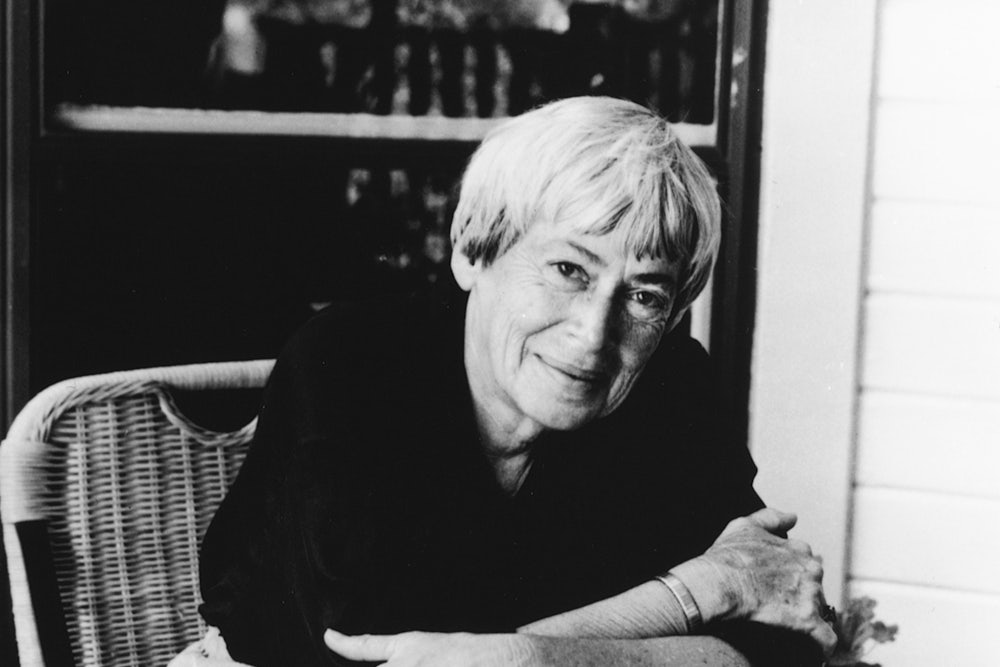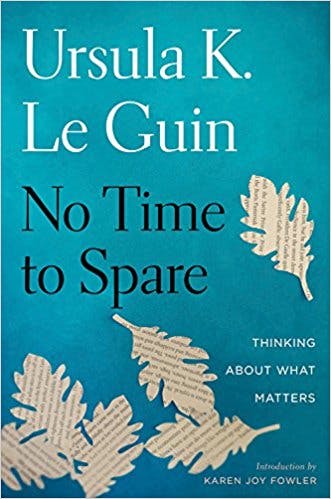
In 2010, at the age of 81, the acclaimed novelist Ursula K. Le Guin started a blog. Blogs never seemed a likely destination for the writer, who by then had a long career in 20th-century traditional publishing behind her. But Le Guin’s new book, No Time To Spare, which harvests a representative sample of her blog posts, feels like the surprising and satisfying culmination to a career in other literary forms.
Thriving in an unexpected genre is nothing new for Le Guin. She began to write stories as a child but didn’t achieve mainstream publication until her thirties. Her difficulties may have had something to do with her subject matter. From the start she eschewed the constraints of realism, choosing to write about the alien and the speculative. In her early thirties she finally found her niche, science fiction. It was an unlikely home for a woman. At the time, the genre was overwhelmingly male and regressive in many other ways, too. In the journal Science Fiction Studies, Le Guin described the state of the field as she first found it:

The only social change presented by most SF has been towards authoritarianism, the domination of ignorant masses by a powerful elite—sometimes presented as a warning, but often quite complacently. Socialism is never considered as an alternative, and democracy is quite forgotten. Military virtues are taken as ethical ones. Wealth is assumed to be a righteous goal and a personal virtue. Competitive free-enterprise capitalism is the economic destiny of the entire Galaxy. In general, American SF has assumed a permanent hierarchy of superiors and inferiors, with rich, ambitious, aggressive males at the top, then a great gap, and then at the bottom the poor, the uneducated, the faceless masses, and all the women.
Today, by contrast, the genre has become one of the preeminent literary spaces for imagining social and political change. Women like Ann Leckie, N.K. Jemisin, Nisi Shawl, Kameron Hurley, Nnedi Okorafor, Aliette de Bodard, among others, are at the forefront of this transformation, and Le Guin was one of their forebears. Her career is filled with achievements in great storytelling that also offer galvanizing visions of worlds that differ from our own: the feminist and anti-capitalist utopias of The Left Hand of Darkness, The Dispossessed, and Always Coming Home; the Taoist epic fantasy of the Earthsea novels; the emancipatory historical fiction of Lavinia. Her work shows the moral character of Le Guin’s mind, a quality that comes through still more lucidly in the blog’s compressed form.
“It doesn’t have to be the way it is. That is what fantasy says,” writes Le Guin in a blog post:
[This is] a playful statement, made in the context of fiction, with no claim to “being real.” Yet it is a subversive statement. . . . Fantasy not only asks ‘What if things didn’t go on just as they do?’ but demonstrates what they might be like if they went otherwise—thus gnawing at the very foundation of the belief that things have to be the way they are.
Le Guin has always been fascinated by the subversive possibility of imaginative writing, and the central conceits of her two best-known series explore it. The Hainish Cycle is a series of stand-alone novels set in the same universe, on separate planets where civilization has developed in radically different ways. Humans can travel between these planets, but they cannot travel faster than light, and so the expenditure of time is prohibitive; but they remain connected through Le Guin’s signature SF invention, the “ansible.” The ansible is a communication device allowing near instant communication between any two points. People on separate worlds who could never cross the vast distances between them in the span of a single life can still communicate. This imaginary technology poses an interesting thought experiment. If two people can only trade information, what effect can they have on each other’s lives? The ansible is an obvious metaphor for writing itself.
The Earthsea Cycle, by contrast, is a series of fantasy novels and short stories set in a universe where anything spoken in Old Speech—a language in which everything has a secret, true name—comes to pass. Again the central conceit appears to reflect the question of writing itself, and how it can affect the world. The condition for using Old Speech—that you must find out a thing’s true name—suggests a condition for good writing: you must describe the world accurately. How could a writer of science fiction and fantasy suggest such a thing?
Le Guin has stated that she thinks of genre as a formal constraint, the way a writer of sonnets might treat the fourteen lines as a limitation that allows for otherwise impossible effects. A book like The Left Hand of Darkness checks all the genre boxes—an alien world, thrilling events, political machinations—but at the same time, it invites us to reflect on the role of sex in everyday life and everyday aggression, as we inhabit the point of view of a male stranger on a hermaphroditic world. Often Le Guin’s protagonists are strangers exposed to new societies, and their visions of otherness become vehicles for the reader’s self-reflection, highlighting the strangenesses in our own world that we’ve become too accustomed to to notice. For Le Guin, imaginative fiction is not “escapist” in the usual, derogatory sense, but in a different, subversive sense: “The direction of escape is toward freedom,” she notes. “So what is ‘escapism’ an accusation of?”
Now, at 87, Le Guin has stopped writing fiction. She continues to blog, and she has found ways to pursue a similar subversive mission in the new medium.
On the blog, Le Guin’s scope is somewhat narrower. A running theme is the life of her cat, Pard. Between each of No Time to Spare’s four topical sections are essays entitled “Annals of Pard.” Devoting such time and interest to the observation of a cat might seem to represent the commonest impulses both of internet culture and old age; but, as always, Le Guin wades into her new genre to deepen and expand it. When Pard brings her a living mouse to and drops it on her bed in the night, her solution is to lock them together in the kitchen until the mouse disappears (whether through elusion or ingestion, she doesn’t know). She reflects on the ethical implications and possible reasons for her resistance to intervention:
I want to say clearly that I do not believe any animal is capable of being cruel. Cruelty implies consciousness of another’s pain and the intent to cause it. Cruelty is a human specialty, which human beings continue to practice, and perfect, and institutionalize, though we seldom boast about it. We prefer to disown it, calling it “inhumanity,” ascribing it to animals. … Wild cat and wild mouse have a clear, highly developed, well-understood connection—predator and prey. But Pard’s and his ancestors’ relationship with human beings has interfered with his instincts, confusing that fierce clarity, half taming it, leaving him and his prey in an unsatisfactory, unhappy place.
Even in the familiar relationship of an old woman and her cat, Le Guin finds an ambit for challenging moral insight and matter for an inquisitiveness that probes the deep time of evolution. She represents an artist unimpeded by old age or acclaim. She continues to look for new sources of otherness in her life, and to give us glimpses of the otherness she inhabits. It took Le Guin the first half of her career as a published novelist to learn how to write female protagonists in a male-dominated and male-glorifying genre, and now she is learning to write from the perspective of old age in the youth-worshipping medium of the internet. “A lot of younger people, seeing the reality of old age as entirely negative, see acceptance of age as negative,” she writes. “Wanting to deal with old people in a positive spirit, they’re led to deny old people their reality. … ‘You’re only as old as you think you are!’” She scoffs at this attitude and points out its logical and moral problems. Unlike capitalism and patriarchy, the illusion surrounding old age is that it is an illusion:
Encouragement by denial, however well-meaning, backfires. Fear is seldom wise and never kind. Who is it you’re cheering up, anyhow? Is it really the geezer? To tell me my old age doesn’t exist is to tell me I don’t exist. Erase my age, you erase my life—me.
Age, she insists, makes one a “diminished thing.” Likewise, a blog does not possess the same artistic or persuasive power as a novel; reading about Le Guin’s cat will not change your life, the way that reading about her strange, freer worlds might. Blog posts are short, topical, and often polemical in a narrow way. On her blog, Le Guin talks about many of the same things she addressed in her stories, but the form itself is a diminished thing. An essay like “A Band of Brothers, a Stream of Sisters,” about the differences between types of gendered solidarity, can never open as wide a space for reflection as the extended thought experiment in differently-gendered solidarity that is The Left Hand of Darkness.
But even in a diminished form of writing, the spirit of Le Guin’s work remains. When she began to blog, she had a predecessor in mind. The Nobel Prize recipient Jose Saramago had also begun to blog in his eighties. His posts were published in English as The Notebooks, and Le Guin thought that “seeing what Saramago did with the form was a revelation.” Reading No Time To Spare, it’s hard not to feel the same about what she has done with the form. Blogs may not be novels, but a blog by Le Guin is no ordinary blog, either. It is a comfort to know, as reality seems to grow more claustrophobic and inescapable, that she remains at her desk, busily subverting our world.
[“Source-newrepublic”]
